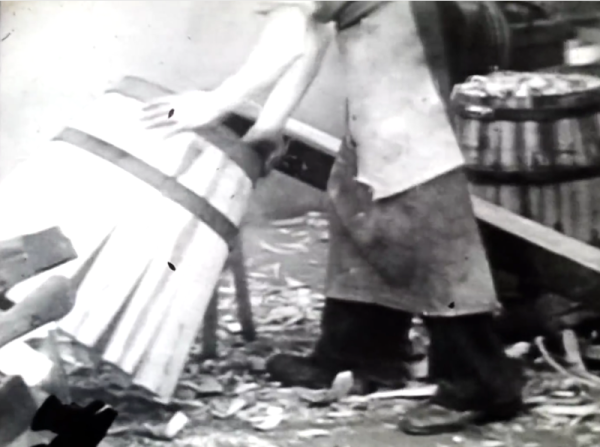For almost exactly 200 years, the Guinness brewery in Dublin, Ireland employed extremely skilled craftsmen to shape and construct wooden casks by hand. These men were called coopers, and plying their trade required several years of apprenticeship. The cooperage was a kind of closed society as many of the positions were passed down through generations of families. With the rise of aluminium and then stainless steel barrels in the late 1950s, the master coopers of Guinness became a dying breed.
Almost every step of the coopering process shown in this film is done without any kind of precise measurement. A master cooper like [Dick Flanagan] here needs only his eyes and his practiced judgment. His barrels start out as oak planks called ‘staves’ that have been drying in racks for at least two years. A cooper selects the staves that strike his fancy and he saws off the ends. This seems to be the only part of the process where a power tool is used.
The cooper shapes each stave by hand with axe and adze so that its ends are tapered just so. Once he has shaped enough of them to make a barrel, he arranges them in a cylinder around the inside of a metal band known as a hoop. The bound staves are steamed for half an hour to make them pliable enough for shaping.
After steaming, the splayed end of the staves are bound with wire rope to pull them close enough together that a hoop can be fitted over them. The inside of the cask is then charred with burning oak shavings, a process that seals the wood and removes its acidity. After this, the ends are sanded and the bunghole is drilled.
For each barrel, the cooper crafts a custom set of hoops. These are installed after the outside of the barrel has been shaved smooth. Finally, the heads that cap each end of the cask are made from more oak staves held together with dowel rods. This is the only time the cooper uses a tool to measure anything, and he does so to achieve the proper circumference on the heads. He bevels the edges so the heads will fit into bored-out grooves in the cask walls. Once they’re seated, the keg is ready for dark, rich stout.
Continue reading “Retrotechtacular: Coopering Guinness Barrels By Hand”











